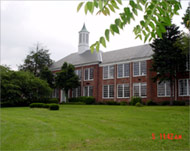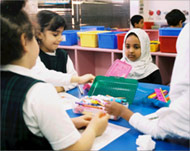US Islamic schools under scrutiny
Islamic schools in the US faced tough questions from critics after 11 September 2001.

Were they teaching students to be anti-American or anti-Jewish? Did they preach intolerance toward non-Muslims? Were they sympathetic to militant Islamist organisations in the Middle East?
In part, but not exclusively because of this scrutiny, a growing number of private Islamic schools are making a greater effort to illuminate their local communities to the reality of their educational systems.
“These schools are a little more in contact with other people than they might have been,” says Karen Keyworth, co-founder of the Islamic School’s League of America, an organisation based in East Lansing, Michigan.
Islamic schools are relatively new to the US. According to Keyworth, while there were no more than 50 in 1987, today there are at least 222.
“A lot of schools are only 10-years old,” she says.
Networking
Her organisation has built an online network of nearly 400 Muslim American educators who communicate with each other on the issues of the day. Many of them are teachers and principals working to provide a link between the schools and the public.
“The schools have been able to reach out to the communities they are in and form relationships,” she said.
 |
|
Islamic Saudi Academy, Virginia |
While Keyworth says she has seen no trend in criticism directed toward Islamic schools, administrators for several such schools say the media and the public often mischaracterised their institutions, especially after 9/11.
“The largest [misunderstanding] was that the schools are run by people who don’t like other people, people who hate non-Muslims,” says Vakai Amin, vice-principal of the Islamic Community School in Baltimore, Maryland.
Despite such perception problems, local community resistance to Islamic schools has been minimal, Keyworth says.
Representatives from some schools say the public response after 9/11 was mostly positive and that several public schools asked them to speak to their students about Islam.
Local funding
There have been exceptions. One Islamic school in northern Virginia, the Islamic Saudi Academy (ISA), experienced problems obtaining approval to build new facilities for the school in 1998.
The school was designed and financed by the government of Saudi Arabia to educate the children of Saudi diplomats, something critics of Saudi Arabia opposed.
The local board of supervisors voted in favour of the school, whose student body is mainly comprised of Saudi children, but also includes non-Saudis of 49 different nationalities. Nearly 70% of the teachers are Americans.
This year, ISA received almost $12 million from the Saudi government, school officials said.
As far as foreign funding goes, ISA remains an exception, according to Keyworth, who says that only “a fraction of a per cent” of Islamic schools take money from foreign governments.
Curriculum questions
Still, many of these schools were scrutinised by the media after 11 September.
A 2002 article in The Washington Post raised questions about whether some Islamic schools, including the Islamic Saudi Academy (ISA) in northern Virginia, were promoting anti-American, anti-Israel sentiments in the classroom.
 |
|
Non-Muslims are attracted to the |
In a written response to questions from Aljazeera.net, Ibrahim al-Kasir, ISA’s director general, said his school “is not encouraging anti-Christian and anti-Western feelings”, and that students are taught to “incorporate the important values of Islam: peace, tolerance and compassion”.
Representatives from four Islamic schools in Washington, DC, Virginia and Maryland all denied they condone discriminatory ideology or use inflammatory textbooks in their classrooms.
Dr Salih Nusairat, principal of the Washington Islamic Academy in Springfield, Virginia, said his school “maintains respect for other people’s faith and open dialogue with other people”.
“There is nothing in this school that teaches things that are not tolerant,” Nusairat says.
Muslim perspective
Some critics have suggested teachers in Islamic schools may be promoting anti-American views on various global issues such as the war in Iraq or the Middle East peace process.
Salim Mahdi, principal of the Muslim Community School in Potomac, Maryland, said that while his school encourages open discussions on current events, it tries to avoid venturing into politics.
“I think it really varies between schools. My idea is to keep the school as an educational institute and not to get involved in politics,” Mahdi said.
Al-Kasir said the Islamic Saudi Academy is an “apolitical” institution, but allows its students the freedom to raise questions about various political subjects they read about in their “American textbooks or in the media”.
“Our teachers are trained to handle such inquiries with professional tact,” he said. “For example, teachers will address questions from all possible angles using facts, not opinions, to address them. This is done so the students can formulate their own opinions based on historical facts.”
Outspoken
While she acknowledged the possibility that a few teachers may have made inappropriate political statements about the US or Israel, Keyworth says such comments are beyond the pale of what is acceptable to the Islamic educational community at large.
|
“I think that we surely have teachers or even principals who say things that we wish they would not have said, because they’re embarrassing” Karen Keyworth, |
“I think that we surely have teachers or even principals who say things that we wish they would not have said, because they’re embarrassing,” she said.
As far as curriculums go, most Islamic schools in the US follow the same subjects as public schools, but include Islamic history and Arabic language courses, several administrators said.
Nusairat, for one, was quick to point out that Islamic schools such as his are not like madrasas, religious schools that teach an exclusively Islamic curriculum.
Comparing American Islamic schools with madrasas is like “comparing apples and oranges”, he said.
Standards
Nusairat says he believes that many Islamic schools actually offer a higher level of education than most public schools.
 |
|
Most Muslim schools still do not |
Students at the Washington Islamic Academy graduate from high school in the 11th grade, one year earlier than public school students, because it teaches coursework at an accelerated pace, he said.
Only 10% of Muslim American children attend Islamic schools, according to Mahdi Bray, president of the Muslim American Society Freedom Foundation. Partly, that is because few Islamic schools extend beyond the 8th grade level.
Not all students who attend Islamic schools are Muslims either. Some non-Muslim parents send their children to Islamic schools for what they believe is the greater emphasis placed on values and high educational standards, Bray said.
“There are Muslim schools that are of such excellence that some parents want their kids to go there because of the moral excellence and the academic excellence,” he said.